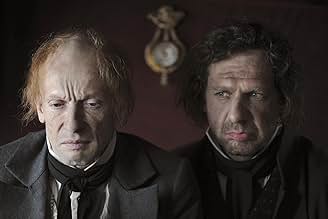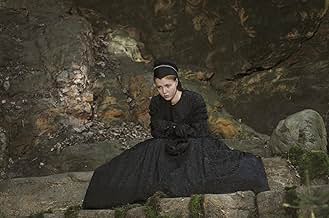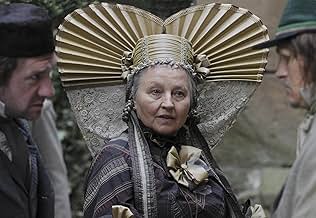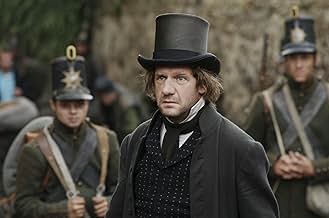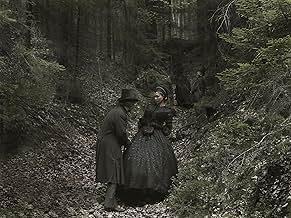VALUTAZIONE IMDb
6,5/10
5906
LA TUA VALUTAZIONE
Uno studioso disperato vende la sua anima a Satana in cambio di una notte con una bellissima giovane donna.Uno studioso disperato vende la sua anima a Satana in cambio di una notte con una bellissima giovane donna.Uno studioso disperato vende la sua anima a Satana in cambio di una notte con una bellissima giovane donna.
- Regia
- Sceneggiatura
- Star
- Premi
- 15 vittorie e 27 candidature totali
Eva-Maria Kurz
- Faust's Cook
- (as Eva Kurz)
Recensioni in evidenza
"Wohin?" "Dahin"
The movie opens with the Herr Doktor cutting open a rotting corpse, declaring that he has looked for man's soul and has found that there is none.
The scene is a microcosm of the film's despairing vision of modern man's immorality, descended into seeing all as mere material. In this world, the old moral code remains only in debased form: good does not exist but evil does. The film's aesthetic is ruled by filth, and everyone's body seems either decaying or malformed (bodies are all they are).
And so too has Faust's famous bargain with the devil been seriously downgraded. Goethe's Faust was foolish but noble: he signed his soul away for knowledge, a mirage of human perfectibility. Sokurov's Faust signs his off without so much as a second thought - and for what? So little! A bit of money and a bit of ass. All here is only bestial (and fleeting) pleasure. There is no longer even a dream of something better. All are selfish, mean and disgusting, loving no one, not even themselves. The film is a nightmarish verdict on modern man: he has given up the better part of himself to live like an animal, and in the end does not even realize what he has done. We the viewer are left to wonder whether there ever was a 'better part' of us at all. However, the one character who seems to recognize the fallen state of things is Faust's father, perhaps an indication that the old generation could still see the devil for what he is. Hardly hopeful, but maybe a sign that modern man's crass materialism and selfishness is not the whole story.
Tiglon's DVD release of Faust comes with a booklet featuring essays by two prominent Turkish film critics, offering insights into both the film and its director, Aleksandr Sokurov.
In Russia, many critics hail Sokurov as the new Tarkovsky. As someone who admires both directors, I disagree. They are distinct cinematic voices, and labeling Sokurov as "the new Tarkovsky" feels like a disservice to his unique artistry. Sokurov has his own cinematic language and is a masterful filmmaker in his own right.
Some call him the Dostoevsky of Russian cinema, and considering this film, they might have a point. Whether adapting literary works or crafting original stories, Sokurov's characters often seem to emerge from the depths of Dostoevsky's world.
For me, Faust was a nightmarish book. It was assigned reading at Deutsche Schule Istanbul, and German has always been a language I've kept at arm's length.
Faust's perilous journey, driven by dissatisfaction with his life and a yearning for the unknown, becomes an unsettling experience for the audience. His hunger for knowledge and the unseen, his desire for the unlived, and his obsession with the unpossessed lead him down a path guided by the Devil. We witness a man, consumed by his quest to locate the soul within the body, ultimately lose his own soul. We watch as a man who once murmured, "In the beginning was the word," succumbs to the Devil's influence and declares, "In the beginning was the deed." We see a man who chases the radiant beauty of Margarete, a symbol of life's splendor, only to drag her into darkness and ultimately vanish into the abyss of the unknown. A crucial detail in this journey is that Mephistopheles (the film's equivalent of Mephisto) never forces Faust's hand. He presents the possibilities and leaves the decision to Faust. In this sense, Faust, who sells his soul to the devil for what he could have, becomes perhaps even more frightening than the Devil himself, as he reveals to us the potential for our own damnation.
The opening scene signals that this won't be a sunny cinematic experience. The chaotic, dark, and eerie atmosphere gradually seeps into our consciousness through the sets, costumes, lighting, and colors. The theatrical scenes and challenging dialogues pay homage to the source material until the very last frame.
Throughout the film, the power of a line spoken by Faust early on, "The god who shakes me inside is powerless outside of me," never diminishes but instead intensifies.
In Russia, many critics hail Sokurov as the new Tarkovsky. As someone who admires both directors, I disagree. They are distinct cinematic voices, and labeling Sokurov as "the new Tarkovsky" feels like a disservice to his unique artistry. Sokurov has his own cinematic language and is a masterful filmmaker in his own right.
Some call him the Dostoevsky of Russian cinema, and considering this film, they might have a point. Whether adapting literary works or crafting original stories, Sokurov's characters often seem to emerge from the depths of Dostoevsky's world.
For me, Faust was a nightmarish book. It was assigned reading at Deutsche Schule Istanbul, and German has always been a language I've kept at arm's length.
Faust's perilous journey, driven by dissatisfaction with his life and a yearning for the unknown, becomes an unsettling experience for the audience. His hunger for knowledge and the unseen, his desire for the unlived, and his obsession with the unpossessed lead him down a path guided by the Devil. We witness a man, consumed by his quest to locate the soul within the body, ultimately lose his own soul. We watch as a man who once murmured, "In the beginning was the word," succumbs to the Devil's influence and declares, "In the beginning was the deed." We see a man who chases the radiant beauty of Margarete, a symbol of life's splendor, only to drag her into darkness and ultimately vanish into the abyss of the unknown. A crucial detail in this journey is that Mephistopheles (the film's equivalent of Mephisto) never forces Faust's hand. He presents the possibilities and leaves the decision to Faust. In this sense, Faust, who sells his soul to the devil for what he could have, becomes perhaps even more frightening than the Devil himself, as he reveals to us the potential for our own damnation.
The opening scene signals that this won't be a sunny cinematic experience. The chaotic, dark, and eerie atmosphere gradually seeps into our consciousness through the sets, costumes, lighting, and colors. The theatrical scenes and challenging dialogues pay homage to the source material until the very last frame.
Throughout the film, the power of a line spoken by Faust early on, "The god who shakes me inside is powerless outside of me," never diminishes but instead intensifies.
The way Sokurov treats this story makes it clear that his characters are all immersed in the day tot day doings, the earthly aspects of our lives, and it is hard or even impossible to escape. He brings it home to us, he gets us involved through his camera and sound, Faust becomes us. The first time I know of that this story was told in such a way that we can actually get inside Faust. Sokurov brings home some intriguing themes. Is Faust's soul maybe already missing from the start? What is our perception of Faust's hell and/or heaven, and how easy are we manipulated? We don't seem to need a lot of arguments and talking to win us over...
a question more than a film. nothing surprising for Sokurov.because not the story is the axis but the atmosphere the air who seems be mud, the dialogues who are cold and bitter, the actors who becomes shadows. a film who propose the world in precise slices. and that is the source of controversies and the heart of a fascinating film about reality and choices. far to be comfortable, it is a challenge. because it propose the aesthetic of ugly things, because firs scene is an open corpse and the pact with devil has different nuances by the classic text of Goethe. but the idea is the same.same, the need of certitude. a film about the taste of knowledge. and the essence of self definition.
it is not the best Faust adaptation. the form is different, the Sokurov ambition to create his story is obvious, the images are pieces from same material of others movies by him. but it is far to be the worst adaptation. short, the lead character of film is the director. and this character is Mephisto in clothes of Faust. the dark scenes, the atmosphere, the dialogs, the Georgian young man or Isolda Dychauk as Renaissance Madonna/Margareta, the first scene and the last, each is letter of a letter who desire say more than its text. a profound film and not uninspired game with a delicate subject. good performance, interesting presence of Hanna Schygulla, smart manner to translate to present the Goethe drama. but , more than philosophic movie, it is a too complicated labyrinth. the ambition is to impress with entire force. but something missing. maybe, the soul.
Lo sapevi?
- QuizIt won the Golden Lion award at the 2011 Venice Film Festival. It is the 3rd Russian film to be crowned best film in Venice, after Ivan's Childhood (1962) and The Return (2003).
- ConnessioniFeatured in At the Movies: Venice Film Festival 2011 (2011)
- Colonne sonoreSalve Regina
(uncredited)
Gregorian chant
I più visti
Accedi per valutare e creare un elenco di titoli salvati per ottenere consigli personalizzati
- How long is Faust?Powered by Alexa
Dettagli
- Data di uscita
- Paese di origine
- Siti ufficiali
- Lingua
- Celebre anche come
- Fausto
- Luoghi delle riprese
- Aziende produttrici
- Vedi altri crediti dell’azienda su IMDbPro
Botteghino
- Budget
- 8.000.000 € (previsto)
- Lordo Stati Uniti e Canada
- 58.132 USD
- Fine settimana di apertura Stati Uniti e Canada
- 10.030 USD
- 17 nov 2013
- Lordo in tutto il mondo
- 64.556 USD
- Tempo di esecuzione2 ore 20 minuti
- Mix di suoni
- Proporzioni
- 1.37 : 1
Contribuisci a questa pagina
Suggerisci una modifica o aggiungi i contenuti mancanti



